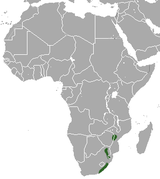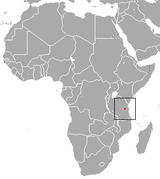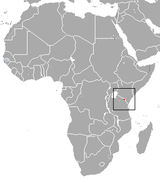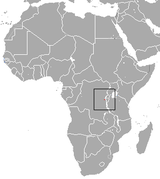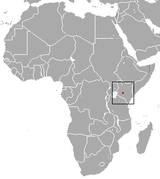Species in mammal subfamily Myosoricinae
Forest shrew (Myosorex varius )Myosoricinae is a subfamily of small mammals in the shrew family Soricidae , which in turn is part of the order Eulipotyphla . A member of this family is called a myosoricine, or an African shrew. Myosoricinae is one of three subfamilies in Soricidae, along with the white-toothed shrews of Crocidurinae and the red-toothed shrews of Soricinae . They are found in central and southern Africa, primarily in forests, and also in shrublands , grasslands , and wetlands . They range in size from the lesser Congo shrew , at 5 cm (2 in) plus a 1 cm (0.4 in) tail, to various members of the Myosorex Surdisorex genera , at 11 cm (4 in) plus a 7 cm (3 in) tail. Myosoricines primarily eat insects and other invertebrates , as well as small birds and mammals. No myosoricines have population estimates, but 7 species are categorized as endangered species : the Geata mouse shrew , Kihaule's mouse shrew , long-tailed forest shrew , montane mouse shrew , Nyika burrowing shrew , Rumpi mouse shrew , and thin mouse shrew . Additionally, the Phillips' Congo shrew and Eisentraut's mouse shrew are categorized as critically endangered .
The 25 extant species of Myosoricinae are divided into three genera; 19 of them are in Myosorex and 3 each are in Congosorex Surdisorex . A few extinct prehistoric Myosoricinae species have been discovered, though due to ongoing research and discoveries the exact number and categorization is not fixed.[ 1]
Conventions
Conservation status codes listed follow the International Union for Conservation of Nature (IUCN) Red List of Threatened Species . Range maps are provided wherever possible; if a range map is not available, a description of the myosoricine's range is provided. Ranges are based on the IUCN Red List for that species unless otherwise noted.
Classification
The subfamily Myosoricinae consists of three genera : Myosorex Congosorex Surdisorex
Subfamily Myosoricinae
Genus Congosorex
Genus Myosorex
Genus Surdisorex
Myosoricines
The following classification is based on the taxonomy described by the reference work Mammal Species of the World molecular phylogenetic analysis , as supported by both the IUCN and the American Society of Mammalogists .[ 2]
Genus Congosorex Heim de Balsac & Lamotte , 1956
Common name
Scientific name and subspecies
Range
Size and ecology
IUCN status and estimated population
Greater Congo shrew
C. polli (Heim de Balsac & Lamotte , 1956)
Democratic Republic of the Congo Size : About 6 cm (2 in) long, plus 2 cm (1 in) tail[ 3] Habitat : Forest[ 4] Diet : Invertebrates[ 5] DD [ 4]
Lesser Congo shrew
C. verheyeni Hutterer , Barriere , & Colyn , 2002West-central Africa
Size : 5–10 cm (2–4 in) long, plus 1–3 cm (0.4–1.2 in) tail[ 6] Habitat : Forest[ 7] Diet : Invertebrates[ 5] LC [ 7]
Phillips' Congo shrew
C. phillipsorum Stanley , Rogers , & Hutterer , 2005Tanzania
Size : 6–8 cm (2–3 in) long, plus 3–4 cm (1–2 in) tail[ 8] Habitat : Forest[ 9] Diet : Invertebrates[ 5] CR [ 9]
Genus Myosorex Gray , 1838
Common name
Scientific name and subspecies
Range
Size and ecology
IUCN status and estimated population
Babault's mouse shrew
M. babaulti Heim de Balsac & Lamotte , 1956Central Africa
Size : 6–11 cm (2–4 in) long, plus 2–7 cm (1–3 in) tail[ 10] Habitat : Forest and inland wetlands [ 11] Diet : Insects, as well as small birds and mammals[ 12] LC [ 11]
Bururi forest shrew
M. bururiensis Kerbis Peterhans et al., 2010Burundi
Size : 6–11 cm (2–4 in) long, plus 2–7 cm (1–3 in) tail[ 10] Habitat : Forest[ 13] Diet : Insects, as well as small birds and mammals[ 12] VU [ 13]
Dark-footed mouse shrew
M. cafer (Sundevall , 1846)
Southern Africa
Size : 6–11 cm (2–4 in) long, plus 2–7 cm (1–3 in) tail[ 10] Habitat : ForestDiet : Insects, as well as small birds and mammals[ 12] VU
Eisentraut's mouse shrew
M. eisentrauti Heim de Balsac , 1968Bioko island in Equatorial Guinea Size : 7–9 cm (3–4 in) long, plus 3–5 cm (1–2 in) tail[ 15] Habitat : Forest[ 16] Diet : Insects, as well as small birds and mammals[ 12] CR [ 16]
Forest shrew
M. varius (Smuts , 1832)
Southern Africa
Size : 7–9 cm (3–4 in) long, plus 3–5 cm (1–2 in) tail[ 17] Habitat : Forest, savanna , shrubland , and grassland [ 18] Diet : A variety of invertebrates[ 19] LC [ 18]
Geata mouse shrew
M. geata (Allen & Loveridge , 1927)
Tanzania
Size : 6–8 cm (2–3 in) long, plus 4–5 cm (2–2 in) tail[ 20] Habitat : Forest[ 21] Diet : Insects, as well as small birds and mammals[ 12] EN [ 21]
Kabogo mouse shrew
M. kabogoensis Kerbis Peterhans & Hutterer , 2013Democratic Republic of the Congo
Size : 6–11 cm (2–4 in) long, plus 2–7 cm (1–3 in) tail[ 10] Habitat : Forest[ 22] Diet : Insects, as well as small birds and mammals[ 12] DD [ 22]
Kahuzi swamp shrew
M. jejei Kerbis Peterhans et al., 2010Democratic Republic of the Congo
Size : 6–11 cm (2–4 in) long, plus 2–7 cm (1–3 in) tail[ 10] Habitat : Forest and inland wetlands[ 23] Diet : Insects, as well as small birds and mammals[ 12] NT [ 23]
Kihaule's mouse shrew
M. kihaulei Stanley , 2000Tanzania
Size : 7–9 cm (3–4 in) long, plus 3–5 cm (1–2 in) tail[ 24] Habitat : Forest[ 25] Diet : Insects, as well as small birds and mammals[ 12] EN [ 25]
Kilimanjaro mouse shrew
M. zinki Heim de Balsac & Lamotte , 1956Tanzania
Size : 8–10 cm (3–4 in) long, plus 3–5 cm (1–2 in) tail[ 17] Habitat : Forest, shrubland, grassland, and inland wetlands[ 26] Diet : Insects, as well as small birds and mammals[ 12] LC [ 26]
Long-tailed forest shrew
M. longicaudatus Dippenaar & Meester , 1978
M. l. boosmani
M. l. longicaudatus
South Africa
Size : 7–9 cm (3–4 in) long, plus 4–8 cm (2–3 in) tail[ 27] Habitat : Forest, inland wetlands, and shrubland[ 28] Diet : Insects and seeds[ 28] EN [ 28]
Meester's forest shrew
M. meesteri Taylor , Kearney , Kerbis Peterhans , Baxter , & Willows-Munro , 2013Southeastern Africa
Size : 6–11 cm (2–4 in) long, plus 2–7 cm (1–3 in) tail[ 10] Habitat : Forest and grassland[ 29] Diet : Insects, as well as small birds and mammals[ 12] LC [ 29]
Montane mouse shrew
M. blarina Thomas , 1906Uganda Size : 6–11 cm (2–4 in) long, plus 2–7 cm (1–3 in) tail[ 10] Habitat : Forest and inland wetlands[ 30] Diet : Insects, as well as small birds and mammals[ 12] EN [ 30]
Nyika burrowing shrew
M. gnoskei Kerbis Peterhans , Hutterer , Kaliba , & Mazibuko , 2008Malawi
Size : 6–11 cm (2–4 in) long, plus 2–7 cm (1–3 in) tail[ 10] Habitat : Forest and shrubland[ 31] Diet : Insects, as well as small birds and mammals[ 12] EN [ 31]
Oku mouse shrew
M. okuensis Heim de Balsac , 1968Cameroon Size : 6–11 cm (2–4 in) long, plus 2–7 cm (1–3 in) tail[ 10] Habitat : Forest[ 32] Diet : Insects, as well as small birds and mammals[ 12] VU [ 32]
Rumpi mouse shrew
M. rumpii Heim de Balsac , 1968Cameroon
Size : 6–11 cm (2–4 in) long, plus 2–7 cm (1–3 in) tail[ 10] Habitat : Forest[ 33] Diet : Insects, as well as small birds and mammals[ 12] EN [ 33]
Schaller's mouse shrew
M. schalleri Heim de Balsac , 1966Democratic Republic of Congo
Size : 6–11 cm (2–4 in) long, plus 2–7 cm (1–3 in) tail[ 10] Habitat : Forest[ 34] Diet : Insects, as well as small birds and mammals[ 12] DD [ 34]
Sclater's mouse shrew
M. sclateri Thomas & Schwann , 1905South Africa
Size : 6–11 cm (2–4 in) long, plus 2–7 cm (1–3 in) tail[ 10] Habitat : Inland wetlands and forest[ 35] Diet : Insects, as well as small birds and mammals[ 12] VU [ 35]
Thin mouse shrew
M. tenuis Thomas & Schwann , 1905South Africa
Size : 7–10 cm (3–4 in) long, plus 3–5 cm (1–2 in) tail[ 36] Habitat : Grassland[ 37] Diet : Insects, as well as small birds and mammals[ 12] EN [ 37]
Genus Surdisorex Thomas , 1906
Common name
Scientific name and subspecies
Range
Size and ecology
IUCN status and estimated population
Aberdare mole shrew
S. norae Thomas , 1906Kenya Size : 6–11 cm (2–4 in) long, plus 2–7 cm (1–3 in) tail[ 10] Habitat : Grassland[ 38] Diet : Earthworms, as well as insects, small birds, and mammals[ 12] LC [ 38]
Mount Elgon mole shrew
S. schlitteri Kerbis Peterhans , Stanley , Hutterer , Demos , & Agwanda , 2009Kenya
Size : 6–11 cm (2–4 in) long, plus 2–7 cm (1–3 in) tail[ 10] Habitat : Shrubland[ 39] Diet : Insects, as well as small birds and mammals[ 12] DD [ 39]
Mount Kenya mole shrew
S. polulus Hollister , 1916Kenya
Size : 6–11 cm (2–4 in) long, plus 2–7 cm (1–3 in) tail[ 10] Habitat : Grassland[ 40] Diet : Earthworms, as well as insects, small birds, and mammals[ 12] DD [ 40]
References
^ "Fossilworks: Soricidae" . Paleobiology Database University of Wisconsin–Madison . Archived from the original on May 31, 2023. Retrieved April 22, 2024 .^ Wilson, Reeder , pp. 263-266^ Kingdon , p. 52^ a b Gerrie, R.; Kennerley, R. (2017) [errata version of 2016 assessment]. "Congosorex polli " . IUCN Red List of Threatened Species 2016 : e.T5221A115071815. doi :10.2305/IUCN.UK.2016-3.RLTS.T5221A22290128.en ^ a b c Kingdon , p. 43^ Kingdon , p. 53^ a b Hutterer, R. (2017). "Congosorex verheyeni " . IUCN Red List of Threatened Species 2017 : e.T44935A22290312. doi :10.2305/IUCN.UK.2017-2.RLTS.T44935A22290312.en ^ Kingdon , p. 51^ a b Kennerley, R. (2017) [errata version of 2016 assessment]. "Congosorex phillipsorum " . IUCN Red List of Threatened Species 2016 : e.T136343A115206194. doi :10.2305/IUCN.UK.2016-3.RLTS.T136343A22290201.en ^ a b c d e f g h i j k l m n o Nowak , p. 217^ a b Gerrie, R.; Kennerley, R. (2019). "Myosorex babaulti " . IUCN Red List of Threatened Species 2019 : e.T41380A22287111. doi :10.2305/IUCN.UK.2019-1.RLTS.T41380A22287111.en ^ a b c d e f g h i j k l m n o p q r s t Nowak , p. 218^ a b Engelbrektsson, P. (2016). "Myosorex bururiensis " . IUCN Red List of Threatened Species 2016 : e.T45954374A45973041. doi :10.2305/IUCN.UK.2016-2.RLTS.T45954374A45973041.en ^ Kingdon , p. 154^ a b Gazzard, A.; Cronin, D. T.; Hearn, G. (2023). "Myosorex eisentrauti " . IUCN Red List of Threatened Species 2023 : e.T14106A238804788. doi :10.2305/IUCN.UK.2023-1.RLTS.T14106A238804788.en ^ a b Kingdon , p. 163^ a b Cassola, F. (2017) [errata version of 2016 assessment]. "Myosorex varius " . IUCN Red List of Threatened Species 2016 : e.T41382A115519477. doi :10.2305/IUCN.UK.2016-3.RLTS.T41382A22286929.en ^ Joseph, Jency (2011). "Myosorex varius " . Animal Diversity Web University of Michigan . Archived from the original on March 31, 2024. Retrieved March 30, 2024 . ^ Kingdon , p. 155^ a b Kennerley, R. (2017) [errata version of 2016 assessment]. "Myosorex geata " . IUCN Red List of Threatened Species 2016 : e.T14107A115120122. doi :10.2305/IUCN.UK.2016-3.RLTS.T14107A22286611.en ^ a b Plumptre, A.; Dando, T.; Kennerley, R. (2019). "Myosorex kabogoensis " . IUCN Red List of Threatened Species 2019 : e.T112042073A112042093. doi :10.2305/IUCN.UK.2019-1.RLTS.T112042073A112042093.en ^ a b Engelbrektsson, P.; Kennerley, R. (2020) [amended version of 2016 assessment]. "Myosorex jejei " . IUCN Red List of Threatened Species 2020 : e.T45954378A166522323. doi :10.2305/IUCN.UK.2020-1.RLTS.T45954378A166522323.en ^ Kingdon , p. 156^ a b Kennerley, R. (2019). "Myosorex kihaulei " . IUCN Red List of Threatened Species 2019 : e.T45047A22287518. doi :10.2305/IUCN.UK.2019-1.RLTS.T45047A22287518.en ^ a b Kennerley, R. (2017) [errata version of 2016 assessment]. "Myosorex zinki " . IUCN Red List of Threatened Species 2016 : e.T45048A115201876. doi :10.2305/IUCN.UK.2016-3.RLTS.T45048A22287643.en ^ Kingdon , p. 157^ a b c Baxter, R.; Willows-Munro, S.; Taylor, P. (2020). "Myosorex longicaudatus " . IUCN Red List of Threatened Species 2020 : e.T14108A22286725. doi :10.2305/IUCN.UK.2020-2.RLTS.T14108A22286725.en ^ a b Dando, T. (2021). "Myosorex meesteri " . IUCN Red List of Threatened Species 2021 : e.T110661822A110662102. doi :10.2305/IUCN.UK.2021-3.RLTS.T110661822A110662102.en ^ a b Kerbis Peterhans, J.; Demos, T. (2021). "Myosorex blarina " . IUCN Red List of Threatened Species 2021 : e.T14111A22286334. doi :10.2305/IUCN.UK.2021-2.RLTS.T14111A22286334.en ^ a b Engelbrektsson, P. (2016). "Myosorex gnoskei " . IUCN Red List of Threatened Species 2016 : e.T45954382A45973051. doi :10.2305/IUCN.UK.2016-1.RLTS.T45954382A45973051.en ^ a b Kennerley, R. (2017) [errata version of 2016 assessment]. "Myosorex okuensis " . IUCN Red List of Threatened Species 2016 : e.T14112A115120383. doi :10.2305/IUCN.UK.2016-3.RLTS.T14112A22286447.en ^ a b Kennerley, R. (2017) [errata version of 2016 assessment]. "Myosorex rumpii " . IUCN Red List of Threatened Species 2016 : e.T14113A115120529. doi :10.2305/IUCN.UK.2016-3.RLTS.T14113A22287321.en ^ a b Kennerley, R. (2017) [errata version of 2016 assessment]. "Myosorex schalleri " . IUCN Red List of Threatened Species 2016 : e.T14110A115120282. doi :10.2305/IUCN.UK.2016-3.RLTS.T14110A22286538.en ^ a b Taylor, P.; Baxter, R. (2020). "Myosorex sclateri " . IUCN Red List of Threatened Species 2020 : e.T14114A22287210. doi :10.2305/IUCN.UK.2020-2.RLTS.T14114A22287210.en ^ Kingdon , p. 161^ a b Taylor, P.; Willows-Munro, S.; Baxter, R.; Monadjem, A.; Child, M. F. (2021). "Myosorex tenuis " . IUCN Red List of Threatened Species 2021 : e.T110662121A22287436. doi :10.2305/IUCN.UK.2021-3.RLTS.T110662121A22287436.en ^ a b Kennerley, R. (2017) [errata version of 2016 assessment]. "Surdisorex norae " . IUCN Red List of Threatened Species 2016 : e.T21134A115160143. doi :10.2305/IUCN.UK.2016-3.RLTS.T21134A22290472.en ^ a b Engelbrektsson, P. (2016). "Surdisorex schlitteri " . IUCN Red List of Threatened Species 2016 : e.T45954401A45973061. doi :10.2305/IUCN.UK.2016-1.RLTS.T45954401A45973061.en ^ a b Kennerley, R. (2017) [errata version of 2016 assessment]. "Surdisorex polulus " . IUCN Red List of Threatened Species 2016 : e.T21135A115160262. doi :10.2305/IUCN.UK.2016-3.RLTS.T21135A22290384.en
Sources




